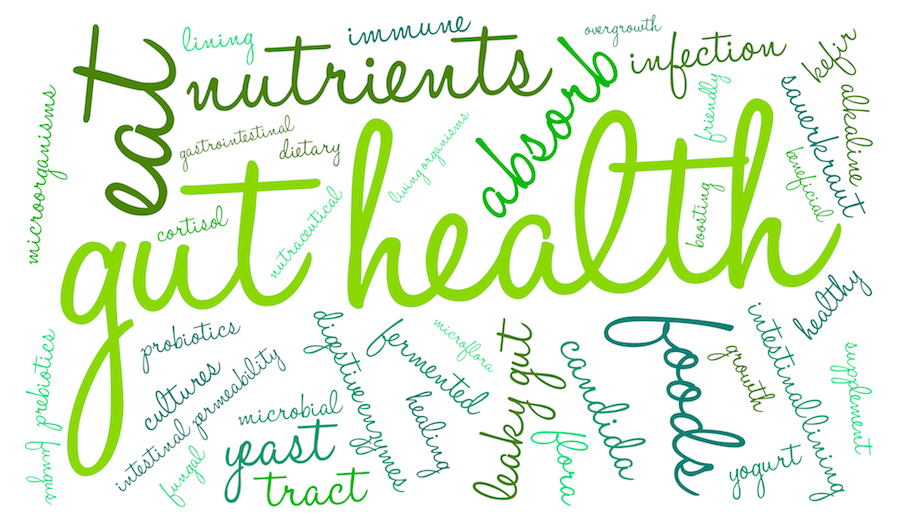Gut Health is KEY
A well-functioning digestive and gastrointestinal (GI) tract is important to overall health and well-being. In fact, 70 perfect of the immune system is made up of tissues located in the GI tract.
From the day we are born, factors such as breast-feeding or cesarean birth may affect the makeup of our gut microbiome. As a health care practitioner, I have the opportunity to support my patients’ individual needs.
So What is the Gut Microbiome?
Well this is also known as gut flora, but what is it really? The microbiome is the genetic material of all the microbes – bacteria, fungi, protozoa and viruses – that live on and inside the human body. The number of genes in all the microbes in one person’s microbiome is 200 times the number of genes in the human genome. WOW! The gut flora, or another name gut microbiota, is made up of a diverse community of both good and bad bacteria living in the GI tract. The gut plays host to more than 100 trillion microbial cells that may impact human physiology, metabolism, nutrition and immune system function.
Where is the gut microbiome located?
Most of the microbes in your intestines are found in a “pocket” of your large intestine called the cecum, and they are referred to as the gut microbiome. Although many different types of microbes live inside you, bacteria are the most studied. In fact, there are more bacterial cells in your body than human cells.
Why is the gut microbiome important?
Okay so now we want to know why is this thing so important! While some bacteria are associated with disease, others are actually extremely important for your immune system, heart, weight and many other aspects of health. The gut microbiome begins to affect your body the moment you are born. Some of the things your gut flora can affect are:
- Weight
- Heart health
- Blood sugar
- Brain Health
- Immune System
What factors affect gut flora?
There are many factors that can affect an individual’s gut flora composition, mainly these are the top 4:
- Age
- Antibiotic use
- Diet
- Non-steroidal anti-inflammatory drugs (NSAIDs)
How Can You Improve Your Gut Microbiome?
There are many ways to improve your gut microbiome, including:
- Eat a diverse range of foods: In particular, legumes, beans and fruit contain lots of fiber and can promote the growth of healthy Bifidobacteria.
- Eat fermented foods: Fermented foods such as yogurt, sauerkraut and kefir all contain healthy bacteria, mainly Lactobacilli, and can reduce the amount of disease-causing species in the gut.
- Limit your intake of artificial sweeteners: Some evidence has shown that artificial sweeteners like aspartame increase blood sugar by stimulating the growth of unhealthy bacteria like Enterobacteriaceae in the gut microbiome.
- Eat prebiotic foods: Prebiotics are a type of fiber that stimulates the growth of healthy bacteria. Prebiotic-rich foods include artichokes, bananas, asparagus, oats and apples.
- Breastfeed for at least six months: Breastfeeding is very important for the development of the gut microbiome. Children who are breastfed for at least six months have more beneficial Bifidobacteria than those who are bottle-fed.
- Eat whole grains: Whole grains contain lots of fiber and beneficial carbs like beta-glucan, which are digested by gut bacteria to benefit weight, cancer risk, diabetes and other disorders.
- Try a plant-based diet: Vegetarian diets may help reduce levels of disease-causing bacteria such as E. coli, as well as inflammation and cholesterol.
- Eat foods rich in polyphenols: Polyphenols are plant compounds found in red wine, green tea, dark chocolate, olive oil and whole grains. They are broken down by the microbiome to stimulate healthy bacterial growth.
- Take a probiotic supplement: Probiotics are live bacteria that can help restore the gut to a healthy state after dysbiosis. They do this by “reseeding” it with healthy microbes.
- Take antibiotics only when necessary: Antibiotics kill many bad and good bacteria in the gut microbiome, possibly contributing to weight gain and antibiotic resistance. Thus, only take antibiotics when medically necessary.
The GI Flora Balance Program
Ultimate Spine & Wellness uses a company called Standard Process which carries a six-week GI Flora Balance Program. Standard Process offers research supported nutrition focusing on whole food phytonutrients and the effects of whole food and other ingredients on health They have more than 85 years of experience, supporting the whole food philosophy of their founder, Dr. Royal Lee. These products are only available to healthcare practitioners and their patients.
The six-week GI Flora balance Program is designed to:
- Support healthy digestion
- Promote health and balanced intestinal flora
- Support healthy elimination
- Support healthy immune system function
4 Principles of GI Flora Balance
- Everyday digestion: supports digestive functionality with appropriate acid and enzyme levels that are key for digestion and absorption.
- Weeding: encourages a healthy intestinal environment to maintain proper GI flora.
- Seeding: supports health gut flora
- Feeding: provides food for microorganisms in the lower GI tract.
Who may benefit fro the GI Flora Balance Program?
- Lower bowel gas several hours after eating
- Passes large amounts of foul-smelling gas
- Indigestion 30-60 minutes after eating
- Burning stomach sensations that eating relieves
- Occasional loose stools
- Gas shortly after eating
- Stomach “bloating”


0 Comments